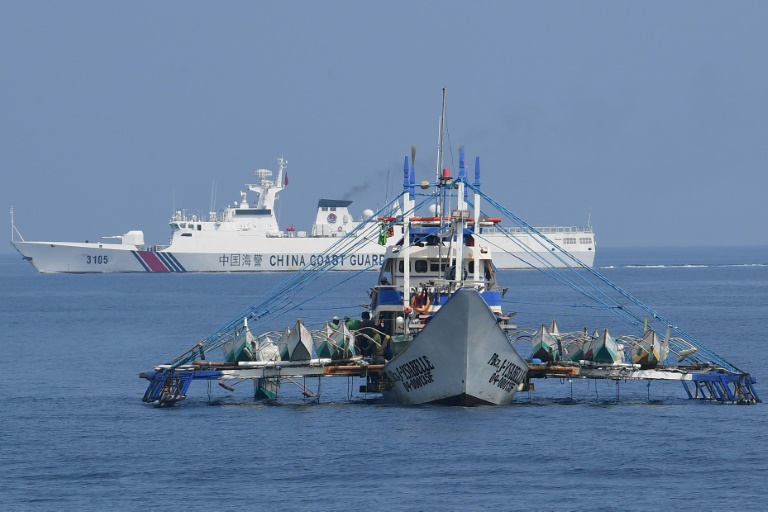KEY POINTS
- China’s Wang said the allies’ “muscle-flexing” is unhelpful in managing maritime disputes
- The US Navy sent two destroyers, a cruiser, and a supercarrier to participate in the patrol
- The Philippine Navy hailed the maritime activity’s success
The Chinese government has criticized the alliance between the United States and the Philippines, calling the joint maritime patrol of the allies in the disputed South China Sea an “irresponsible” move that disrupts stability in the region.
“We would like to stress that the U.S. and the Philippines’ muscle-flexing, provocative military activities in the South China Sea are not conducive to managing the situation on the sea and handling maritime disputes,” said Chinese foreign ministry spokesperson Wang Wenbin during a Thursday press briefing.
He said the allies should “stop the irresponsible moves, and respect regional countries’ efforts to uphold peace and stability in the South China Sea.”
The provocative US-Philippine military muscle-flexing in the South China Sea is not conducive to managing the maritime situation and disputes. We urge relevant countries to stop irresponsible moves and respect regional countries’ effort for a peaceful and stable South China Sea. pic.twitter.com/TxSaJZ7UD7
— Spokesperson发言人办公室 (@MFA_China) January 4, 2024
Wang’s comments came shortly after the U.S. Navy, which held its second joint patrol with the Philippine Navy from Wednesday through Thursday in the South China Sea, published details of its “successful” activity with its Southeast Asian ally.
In a statement, the U.S. Navy revealed that its participating assets were the Nimitz-class supercarrier USS Carl Vinson, two Arleigh Burke-class guided-missile destroyers (USS Sterett and USS Kidd), and the Ticonderoga-class guided-missile cruiser USS Princeton.
For the Philippine Navy’s part in the activity, participating vessels were the landing platform dock BRP Davao del Sur, and offshore patrol vessels BRP Ramon Alcaraz and BRP Gregorio del Pilar.
“Sailing and operating together demonstrates our commitment to improving our interoperability and information sharing with the Armed Forces of the Philippines (AFP),” said Rear Adm. Carlos Sardiello, commander of the USN’s Carrier Strike Group (CSG) 1.
On the first day of the patrol, two Chinese battleships shadowed U.S. and Philippine vessels “all day,” local media reported. The BRP Ramon Alcaraz delivered five radio challenges to tailing Chinese destroyer Hefei, but the crew did not respond, as per the report.
The Chinese People’s Liberation Army (PLA) also conducted what it said were “routine patrols” in the South China Sea Wednesday and Thursday.
Despite the alleged shadowing incident, the AFP said the allied countries “successfully completed” their second joint maritime activity.
The Armed Forces of the Philippines (AFP) and the United States Indo-Pacific Command (USINDOPACOM) successfully completed the second Maritime Cooperative Activity (MCA) on January 3-4, 2024.
#AFPyoucanTRUST pic.twitter.com/czVQTj7FcQ— Armed Forces of the Philippines (@TeamAFP) January 4, 2024
Beijing’s latest remarks regarding the U.S.-Philippines alliance came less than a month after the Philippine Coast Guard (PCG) published footage that showed Chinese Coast Guard (CCG) ships blasting water cannons at Philippine boats in two separate resupply missions.
A Philippine resupply boat was also “rammed” by a CCG vessel last month, an official with the PCG said.
Last month’s incidents were the latest in a series of confrontations in the South China Sea between Chinese and Philippine ships throughout 2023. Manila has lodged multiple diplomatic protests over what it calls were Chinese aggression within the Philippines’ exclusive economic zone.
Despite the 2016 international arbitral ruling that stated China had “no legal basis” for claiming virtually the entire South China Sea, Beijing asserts its 10-dash line claim and continues to display its maritime arsenal in waters disputed by the Philippines and several other Southeast Asian nations.







